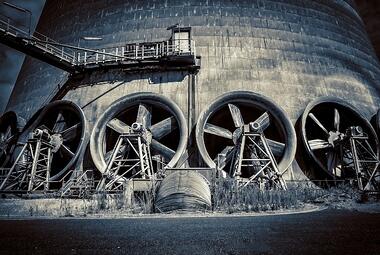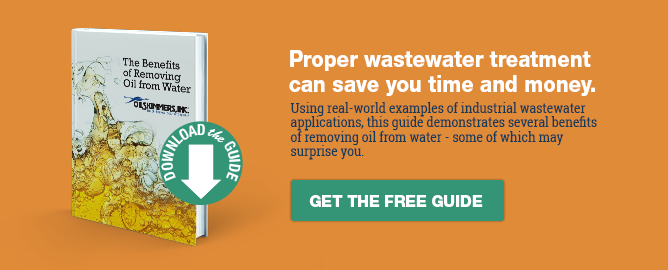 Water plays an important role in most industrial processes and
is often mixed with oil as a result. Removing oil from water early and often by way of skimming is key in
maintaining a healthy process. In fact, if ignored, oily water could be detrimental to your
productivity, reputation, and ultimately, your bottom-line.
Water plays an important role in most industrial processes and
is often mixed with oil as a result. Removing oil from water early and often by way of skimming is key in
maintaining a healthy process. In fact, if ignored, oily water could be detrimental to your
productivity, reputation, and ultimately, your bottom-line.
In this post, we’ll present six potential consequences if oil is not separated and removed from water early in the water treatment process.
1. Inefficient Wastewater Treatment
If oil is not removed from water early, it can make its way downstream to your filtration and monitoring equipment. If this occurs, the oily water can clog or blind filters, and shorten the lifespan of probes and sensors. Maintenance issues like these can slow down or halt your process entirely, as your team fixes or changes out equipment.
Running oily water through your treatment equipment may also require additional chemicals. So not only does it make your treatment process less efficient, it’s costlier.
2. Unexpected Downtime
If the oil and water are allowed more time and opportunity to mix in a turbulent process or waste stream, or pumped from one location to another, oil can emulsify and become more difficult to separate and remove. As noted, oily water can cause equipment issues and unexpected downtime for maintenance and repairs. And whenever production processes are halted, your operation risks efficiency issues and profit loss.
3. Environmental Testing and Fines
Each municipality has a threshold for the acceptable amount of oil to enter their treatment plant. If you are unable to remove enough oil from your wastewater, the municipality may request additional testing. You will be asked to pay for this. And if the tests find that you have exceeded the maximum oil threshold, you will also be responsible for any resulting fines.
Keep in mind: this is no small cost. EPA clean water fines for businesses can reach $200,000.
Another detriment to not properly removing oil from water is that you could be sacrificing revenue. If waste oil is efficiently removed and treated properly, it can be reused or resold for a profit.
4. Degraded Oil
Oil used in industrial processes can be a valuable financial resource.
Where waste oil was previously hauled off and discarded, early, efficient removal allows oil to be reused or sold. Some reuses take place within the same company; in others, the oil is sold.
Either way, the closer to the source the oil is skimmed from the water, the purer it is. Purer oil yields a higher reuse and resale value than oil that has been allowed time to degrade.
5. Diminished Performance of Cooling Towers
Many industries like steel, power generation, petrochemical, and oil refineries utilize cooling towers to remove heat from their cooling water. Failing to remove oil from the water in this instance can cause the cooling towers to become coated in oil, reducing their operational efficiency.
The cooling towers will no longer cool to the same standard and will require more frequent maintenance. As this happens, you will experience equipment downtime and additional staff maintenance hours.
6. Reduced Life of Process Solutions
Manufacturing processes utilize coolants for machining parts and wash solutions for parts washing. If oil isn’t removed after use, these solutions will need to be replaced more frequently—costing you for the additional solution, downtime for the replacement and staff time for the extra maintenance required.
It’s critical to extend the life of coolants and wash solutions because:
- The cost of replacement.
- The cost of labor associated with replacement.
- The cost to dispose of spent coolant.
Don’t let oily water ruin your productivity, reputation, and especially, your revenue. Oil skimming can be your competitive advantage.
Designed to improve overall operations while reducing costs, among other benefits, a quality tube-type oil skimmer, stand-alone, or integrated into a complete system or oil water separator, offers advanced operation for an efficient, cost- effective oil removal process.
Download the free eBook, The Benefits of Removing Oil from Water for more information.

